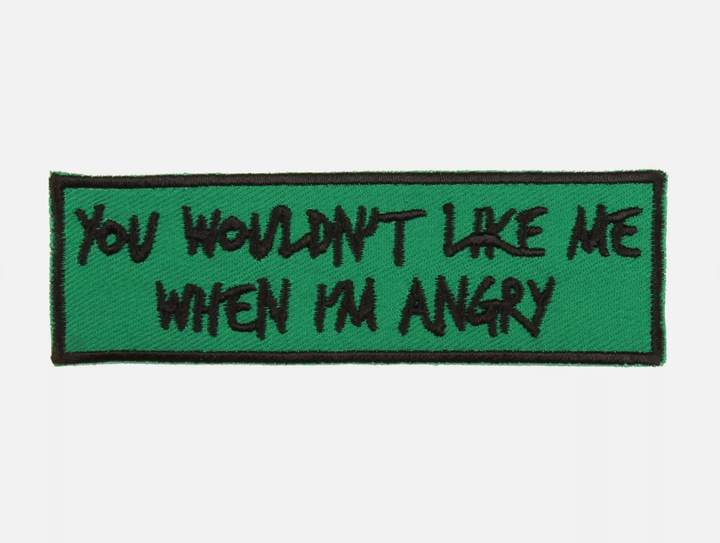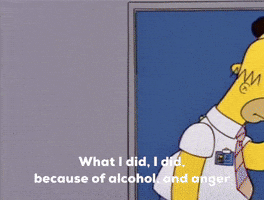The Alcohol of Emotions
I was blessed with a really long fuse, so it takes quite a bit to get me to the point of explosive anger—but once that fuse has burned completely, there's a monster that comes out who I don't really recognize, appreciate, or enjoy.

Once upon a time, I was wholly powered by lust and spite. Lust drove my desire to consume and collect beautiful people, things, and experiences. Spite fueled my passion to dominate, succeed, and prove anyone who ever doubted me wrong. And underneath these two charged emotions lay an even deeper emotion—amplifying, nurturing, and sustaining them. A darker emotion—one that's not as socially acceptable or charming. An emotion that quietly (for the most part) guided me throughout my teenage and young adult years, and colored every experience I had during that time. And that emotion was anger.
Anger is what allowed me to treat women like objects for my pleasure without much consideration for their feelings. Not anger at women specifically—but anger at what I'd perceived to be an unfair hand dealt to me by the Universe. Anger that made me incapable of caring about other people's pain because I was in so much pain myself—and nobody cared about mine.

Anger is what determined that, since I couldn't have my father in the way that I wanted, I would instead conquer him and pursue what I thought he saw as "successful"—not because I wanted to make him proud, but because I wanted to make him jealous. Because I wanted to constantly remind him that he'd abandoned and neglected the best thing he'd ever contributed to creating.
You wouldn't have known that anger was my driving force by looking at me. So many times, I've heard, "I couldn't picture you angry," because, for the most part, my temperament has always been pretty cool. I learned at an early age that there's not much benefit in allowing others to see you sweat. Despite always having a vivid emotional experience on the inside, it wasn't until I began to heal in my mid-20s that I started to express that emotional experience externally in a healthy way. I was blessed with a really long fuse, so it takes quite a bit to get me to the point of explosive anger—but once that fuse has burned completely, there's a monster that comes out who I don't really recognize, appreciate, or enjoy.
Drunk In... Anger
To be honest, anger is one of a handful of emotions that I don't have a ton of conscious experience with. The reason is, whenever I'm the most angry, I'm also the least conscious. And so, it's difficult for me to consciously process anger in the moments when it's most intense—because there's no "me" present to be aware of what's happening. And that's precisely why I feel that anger is so dangerous.
In my experience, anger is like the alcohol of emotions. A little bit of it has many practical applications, and even some recreational value, in how it provides an energetic boost and lowers the inhibitions that are present when we're fully "sober." But when we overindulge in anger, we lose all sense of consciousness, and we're liable to unknowingly engage in behavior that is destructive to ourselves and everything in our paths.

One of the most frightening experiences of my life is becoming so angry that I "black out"—that is, losing all sense of my identity, losing all sense of conscious control, and becoming this ball of rage with a singular goal: to transfer as much of the heat and hurt I feel on the inside to the outside, onto whoever and whatever is in front of me at the moment. And much like blacking out from drinking too much, what's most scary in these moments is acting from a totally unconscious state, which makes it impossible to recollect, reflect, or validate what happened—because in those moments, the anger causes the "I" to cease to exist.
Ironically, it's this same nature that makes anger such a desirable state for so many people. Self-consciousness is really only enjoyable once we've become interested in working on ourselves and healing the parts of us that have been wounded. Until that point, self-consciousness is uncomfortable—and that's precisely why the vast majority of people are constantly seeking entertainment, pleasure, and other intoxicants like anger in order to forget themselves and their pain.

I think this explains why reactionary outrage culture is so dominant on the internet these days. People are constantly searching for content that evokes emotion—often rage—because being in that state is intoxicating. And that intoxication allows them to project the pain that lies at the root of their anger outward, onto situations and strangers who have nothing to do with the pain they're actually experiencing.
Anger Makes Compassion Impossible
I recently fell victim to being attacked by strangers on the internet who intentionally misunderstood something I said on Threads. Through that intentional misunderstanding, they tried to project pain that I wasn't responsible for onto me.
I had been reflecting on something Kanye West recently said about wanting to kill himself at least once a month—every month—since his mother passed away. Despite how unhinged Kanye has seemed in recent times, reading this evoked a deep sense of compassion in me. It triggered me to reflect on the state I was in when my own mother died—a state that was mentally unstable, to say the least.
I remember tweeting within hours of my mother taking her last breath that I was losing my mind. And I meant it. Whoever or whatever I knew myself to be before those moments no longer existed. And whoever I was in that moment, I didn’t recognize. It was like existing in a void. Similar to the "blackout" state I described above, where no sense of self exists and you feel like you could become anyone and do anything.
And that’s why reading what Kanye said made me feel so compassionate toward him. Because I know that me turning out as stable as I have has much more to do with the grace of God than with any effort of my own. Things could have easily gone a very different route for me.

I very plainly stated in my Thread that my compassion for Kanye did not condone his behavior, nor did I believe that his mother’s death was a valid excuse for how he was acting. And yet, I still received an overwhelming number of angry responses from people saying things like, “My parents died and it didn’t turn me into a Nazi.”
As if, just because something affected you a certain way, that should be the outcome for everyone else—which is fuzzy logic, at best.
Other responses accused me of excusing his behavior because of his mother’s death, which I very clearly did not do. But because these people were so blinded by their anger, they misinterpreted my compassion for Kanye’s state as support for his actions—and that’s because anger makes compassion impossible.
These people were angry at the world, at themselves, at so many other things. And in that anger, they forfeited the capacity to comprehend, to think critically, or to actually hear what I was saying. They were so intoxicated by anger that they’d lost the ability to be objective. As a result, they couldn't take my statement at face value; instead, they reacted to what they perceived me to mean.
I’d be willing to bet that, for many of these people, their anger was entirely justified. I mean, Kanye West is a self-proclaimed “Nazi,” after all—who’s recently gone as far as to attack people’s children, which is, without question, reprehensible.
But the idea that the people who make us angry don’t deserve compassion is a very dangerous precedent to set. Because all of us, at times, will make ourselves angry. And if we claim that those who anger us don’t deserve compassion, then we are ultimately denying compassion to ourselves.

Ironically, denying compassion to ourselves is exactly how we get people like who Kanye has become in his current state. So, in my opinion, when we deny Nazis, bigots, Republicans, Democrats, Black people, white people—and whoever else makes us angry—compassion, we’re only creating more of what we claim to despise.
At The Root of Anger is Unresolved Pain
I remember sitting outside one day, in the heat of the summer, and noticing myself getting more and more angry by the moment—for no other reason than because I was hot. This led to an epiphany that’s incredibly obvious in hindsight, but I think it's often overlooked: pain leads to anger. Or rather, unresolved pain leads to anger.
Even before it was scientifically justified, it's been well known in hoods across the world that murders pick up in the summer months because heat leads to increased irritability and discomfort—otherwise known as pain—and pain, when unresolved and unprocessed, eventually leads to anger. Anger, due to its intoxicating nature, leads to poor choices. And that’s why anger lies at the root of most violent crime.
I’ve seen people online do their best to justify anger. “Your anger is sacred,” they say. “Your anger is righteous.” “Your anger is a gift.” And I don’t entirely disagree with this. I think all emotions are expressions of the Divine in their own way, and all emotions deserve room to exist.
But that’s why I’m skeptical when I read statements like these—because I would also expect them to assert that “Your despair is sacred,” or “Your depression is sacred,” or “Your fear is sacred.” But I can’t recall ever seeing statements like that.
So it seems to me that they don’t really believe all emotions are sacred, but rather want to justify their anger by calling it “sacred”—because there’s a part of themselves that enjoys feeling angry and wants to cling to it.
This perception inspired me to poll my Threads community on whether or not they thought that anger was an enjoyable emotional state. Here are the results of that poll:

Out of the 15 people who participated, 20% said they enjoyed being angry, and 80% said they disliked it. This is a small sample size, of course, but I imagine it pretty accurately reflects the majority’s sentiments—and here’s why:
It’s evident to me that most people don’t like being angry because, when we’re angry, we usually want to do everything in our power to get rid of that anger as quickly as possible. There are both healthy and not-so-healthy ways of doing this.
In my opinion, a healthy way of transferring anger is through any method that doesn’t cause harm to yourself or someone else. This could include exercising, going for a walk, writing, hitting a punching bag, going into the forest and screaming at the top of your lungs—whatever helps release the energy safely.
Not-so-healthy ways of transferring anger include physically or mentally harming yourself or another being—or, like the person who responded to my post about Kanye by calling me a “Nazi enabler,” projecting your own pain onto someone who didn’t cause it.

If we truly believed that anger was a sacred and righteous experience, we wouldn’t be in such a hurry to get rid of it once it comes upon us. And the projections and reactions we see on social media every day are exactly that—people desperately trying to escape the discomfort of their own anger by projecting it onto people they don’t know.
Anger can become a sacred and righteous experience—but only once we’ve learned to sit with it and transmute it into right action. When we allow our anger to become a projection we use to attack others, there’s nothing “sacred” or “righteous” about it.

That being said, nuance is important, and a few members of our community added additional context to their responses to my poll and explained that while they may not enjoy anger, they see it as a valid experience—which I could not agree with more. Here are their responses:





In conclusion, I don’t think anger is “bad,” “evil,” or “wrong” in any sense. I think anger is an incredibly powerful expression—an intoxicatingly powerful emotion—and that’s precisely why it’s so important that we work to understand and process it, so that we do not become slaves to it. So that we do not neglect our healing because of it. So that we do not become the very thing we claim to want to destroy because of it.
Whether we want to accept it or not, it’s unity that will bring about the world we want to live in—and unabated anger is one of the greatest sources of division there is.
Anger management need not be reserved for those of us who experience it most intensely. Instead, whenever anger arises, we should do our best to tend to it consciously—to uncover its roots, and to express and/or transmute it in ways that support our healing and growth rather than thwart it.
We should notice whether our anger makes it difficult to feel compassion for others, because it almost certainly means it’s making it difficult to feel compassion for ourselves. Because without compassion, anger can easily become a weapon we turn on everything—including ourselves.
And if we’re not careful, anger stops being a messenger meant to serve us and quickly becomes a master we unconsciously serve instead.
With love,
Micheal Sinclair 💜
